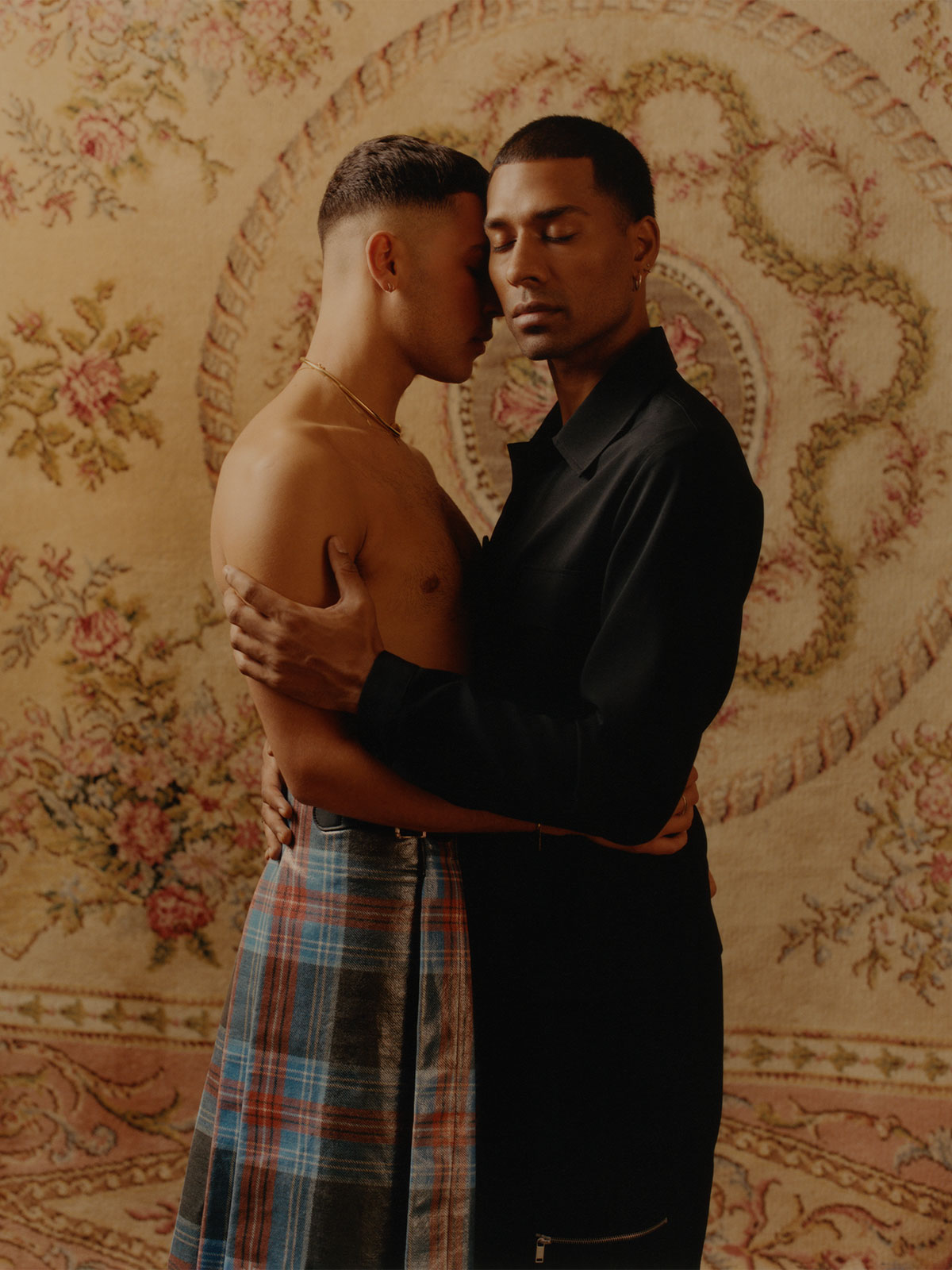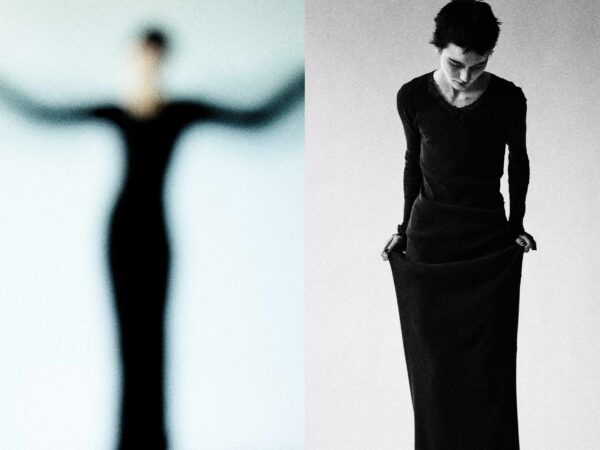In this exclusive fashion portfolio, a diversity of Muslim artists and performers illustrate the hybridized nature of identity
“Islam is one of the most diverse religions in the world—yet Muslim representation in western media is either non-existent, or incredibly negative,” says Suleika Mueller. The photographer was born in Basel, but raised partially in a Sufi order based in Khartoum, Sudan. She struggled to reconcile the Muslim community she knew with the one that frequented the western press. “The vilification couldn’t have been further from my own experience. I think that’s where this deep urge to show how beautiful, peaceful, and incredibly diverse Muslims really are comes from.”
It’s thanks to this desire that Mueller teamed up with creative director and stylist Nikhil Mansata. For Document, the pair devised a photo series that would spotlight a variety of Muslim creatives—complicating western culture’s normative and often limiting assumptions, and highlighting the hybridized nature of identity. “Nikhil and I wanted to turn [the in-between] into a space where we could live and thrive,” says Mueller. It’s an act of taking back the narrative—of giving voice to others, and in turn, to themselves.
Humi; Model and designer
Where do you feel most at home, or in what circumstances?
If I had to respond instinctively, I would say in Italy. I feel at home in my favorite café, eating a brioche with a cappuccino, while hearing other people speak in the same language as me. I also feel at home when I do what I love. Writing, reading, sewing—anything that forces me to travel with my mind is home for me.
How has your Muslim community defined, or not defined, your identity and creativity?
I grew up in a conservative family, which has always [conflated] religion and culture with personal identity. I was told that my creativity had to be limited by [my Muslim practice]. I began to study and see religion as my relationship with Allah, without any rules or restrictions. No religion condemns love for something.
If it hadn’t been for my Muslim identity, I would never have discovered what creativity is. I’ve always been a curious being; however, no one had ever taught me how to express my emotions. How is love managed? What about anger? How do you get rid of sadness? I discovered that my way out was to create. Creativity is my valve for expression. I strip myself from words, I channel my emotions, and let them fly with my imagination.
Society believes religion kills identity. If a culture is not progressive, neither is its vision of religion. The most serious problem is the ignorance that reigns among the people. It is not the veil that makes us submissive. It is not devotion to Allah that makes us terrorists. And it is not fidelity to the Koran that makes us archaic. It is the lack of knowledge that can make us prisoners.
Juliette Motamed; Actress and musician
How do you relate to your character, Ayesha, from We Are Lady Parts? Was it a challenge to assume that role?
I loved playing the character of Ayesha. It was such a freeing experience to be able to tap back into that stony-faced, adolescent, punk energy, let alone to have the opportunity to smash the shit out of a drum kit every day.
The greatest challenge was maintaining Ayesha’s vulnerability, alongside her aggression. It was really important to me and [director Nida Manzoor] to have that depth of feeling—even when it’s [disguised by] a mean poker face.
Acting for film, and musical performance: How do the two intersect?
I love performing in all its capacities. With acting, you surrender to someone else’s vision; with music, you’re able to craft your own world. It’s been really exciting to bounce between these two modes, especially now that I’ve released my new music video, NAZAR, into the world!
DEU; Model, stylist, and photographer
You’re a model-stylist-photographer—a foot in every fashion-world camp. Do these roles inform one another, or do you approach them as three entities?
They’re three different entities, but I’m blessed to have them all on one plate. I’m thankful to all the amazing, creative artists I work with: You inspired my passion for the trio, each time you opened your hearts to tell me about your [artistic] journeys.
How has your Muslim community defined, or not defined, your identity and creativity?
Growing up with Muslim friends helped my emotional growth; [I gained an] Islamic education through them, to know what is right and wrong to Allah.
Art is the reflection, the mirror-image of the Creator’s gesture. I don’t believe in art without God. I see it as my duty to reflect on what is essentially human and eternal in each individual soul. In the end, everything can be reduced to the one simple element: the capacity to love. If my art can bring people to God, so much the better.
Rana Begum; Artist
Photographed with her daughter, Aisha
How has motherhood affected your creative and cultural practice?
It has made time more precious. I have to be more productive, and think faster. However, the overlap also generates interesting conversations and new ways of thinking. I love talking to my kids about what is
going on with my work. Living and creating in the same place means there’s a lot of overlap—sometimes, they even get involved in the making! I love to take them on residencies with me. Seeing things through their eyes helps free up my mind, away from all the daily practicalities of the studio.
I believe, as a woman, if you want to have kids and a career you should be able to. It hasn’t been easy being a single parent, as much as I love it. It is the hardest job, and it keeps getting harder. Trying to navigate how to ground them, to teach them about life, to give them access to both of our cultures… Often, it feels like there is an imbalance.
Tell me about your earliest connection to art. Do you see similarities between Aisha and your younger self, in that regard?
It was at school here, in the UK, when my family and I first arrived. I couldn’t speak any English, [and so] I slept through the first day. The second day, I was given colouring pens, pencils, and paper. That’s when I started drawing. I couldn’t stop, and everything I drew went up on the wall. It was a way of communicating where I was from, and my experiences, and it [connected me] with others.
I definitely see similarities between Aisha and my younger self. Her sheer determination and focus reminds me of what I was like! Aisha is so strong-willed and confident—she is going to be a force to be reckoned with.
Aisha, what is your most unique quality? What about your mother’s?
I am a very positive and loyal friend! Mummy’s most unique quality is seeing loads of colours and shapes in the world.
How do you think the world will change between now, and when you’re an adult?
The world would be greener, and less pollution. I hope there are no more pandemics.
Elif Gonen; Director
How did you land on videography, over any other creative outlet?
Since I was young, I’ve always had a special love for watching films back-to-back. When I started university, part of my course required me to do some editing. It made me pay attention to detail in films—I would break down how things are actually shot, frame by frame. I would see editing techniques used in major music videos, and I’d think to myself, I could do that.
I decided to experiment with making music videos, just so I could try out these techniques. It helped that [I’d moved to] London; I was around an abundance of underground DIY artists who were up for collaborating, and great muses. I made a documentary over lockdown, and it got noticed by some magazines and labels. Next thing I knew, my inbox had some job requests, and I fell into the life of a director. I always keep it experimental, though, and I’m open to branching down different creative paths.
How has your Muslim community defined, or not defined, your identity and creativity?
I grew up in a conservative Muslim city called Bursa. Growing up, I’d get to see my whole family come together during Ramadan and Eid. Our traditions, our culture, our food, are a huge part of my identity. But as Turkey became more and more religious on a political front over the years, I found it harder to express myself freely.
My identity mostly influences what kinds of narratives I want to create in my own work. I find myself, naturally, much more passionate about projects that feel close to me—and [in these cases], the end product feels more authentic. There is space for [a variety] of Muslim narratives that should be portrayed in the media. At least speaking from a Turkish perspective, I have witnessed that there are more than one defining ways of being Muslim, or of a Muslim background. There are so many artists, radicals, and LGBTQ+ [creatives] who are yet to be portrayed in the mainstream media, on a scale that could change the status quo.
Models Ikram Abdi at Premier; Humi at Models1; Elif Gonen at Anti-Agency; Deu at PRM; Hasan Ali at Milk; King at Kult; Juliette Motamed, Bari Khalique, Shaheen Jafargholi, Rana Begum, and Aisha. Hair Chloe Frieda using Living Proof. Make-up Laila Zakaria using Epara Skincare and Viseart Cosmetics. Set Design Hana Al-Sayed at Future Rep. Photo Assistant Thomas Francis. Styling Assistants Roshni Sukhlecha, Vedika Sharma. Hair Assistant Siti Haval. Make-up Assistant Viviane Melo. Set Design Assistant Molly Marot. Casting Director Affa Osman. Casting Assistant Kamahl Sami-Miller. Executive Producer Chantelle-Shakila Tiagi at TIAGI. Producer Mica Kossakowska at TIAGI. Production Coordinator Phoebe Asker at TIAGI.







































